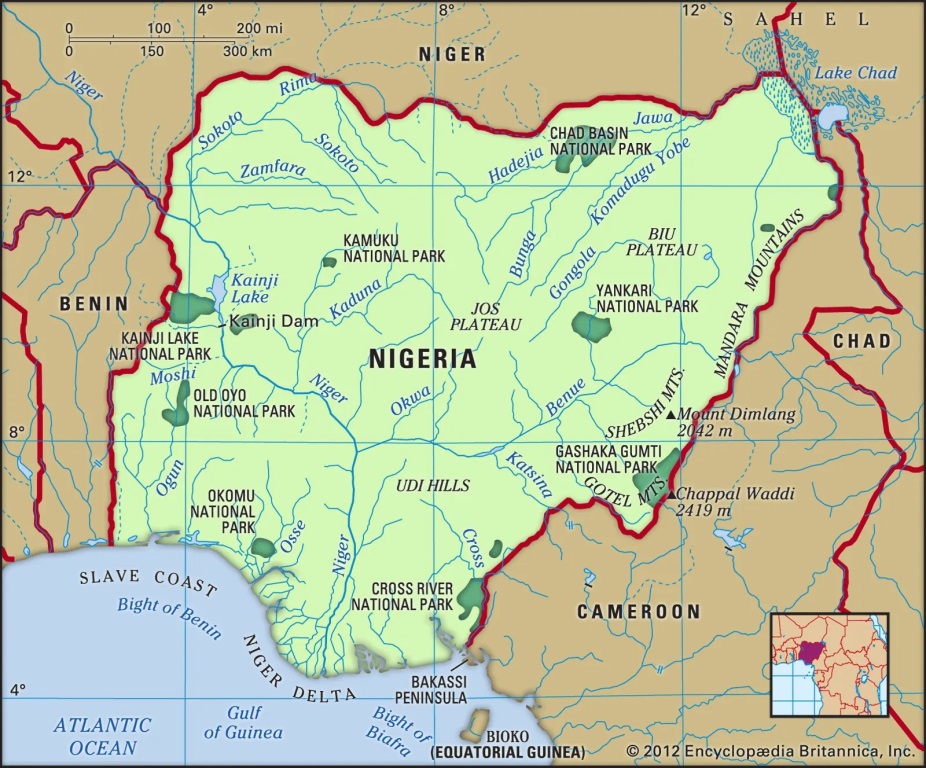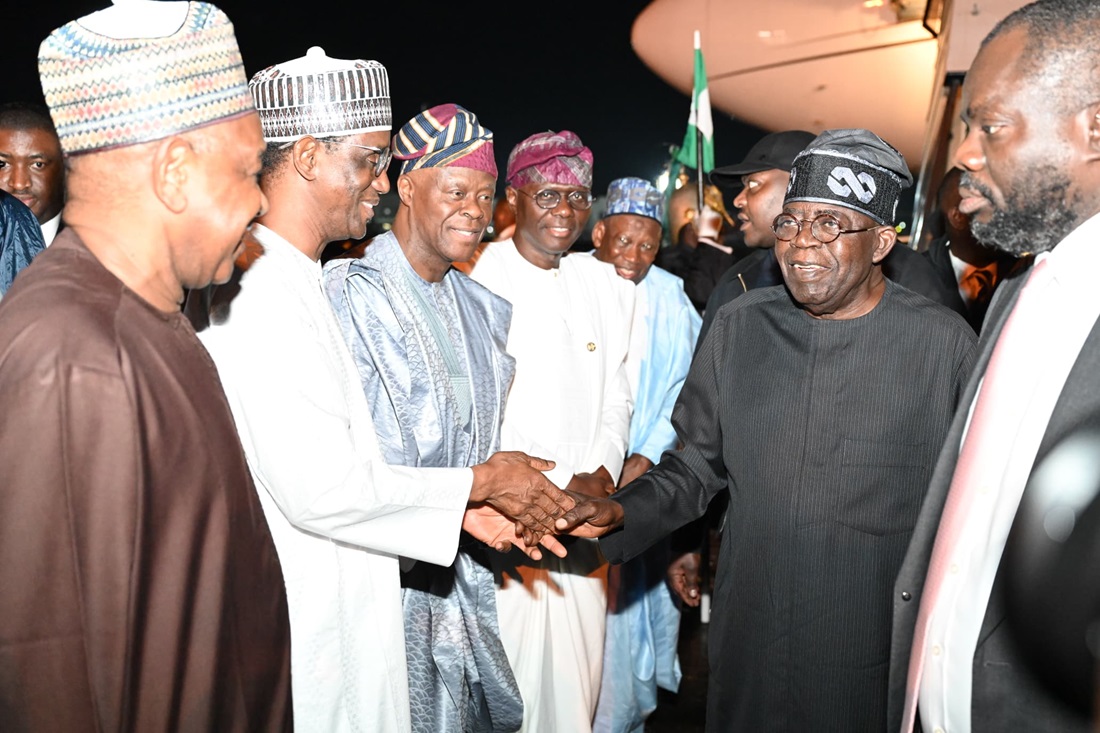Feature/OPED
Nigeria, What is the Way Forward?

By Prince Charles Dickson PhD
A sheep was passing and saw a lion crying inside a cage trapped, the lion begged the sheep to rescue him with a promise not to kill and eat it, but the sheep refused. After much persuasion and the sheep’s gullibility, it opened the cage for the lion.
Now, the lion was very hungry, having stayed in the cage for days without food. It quickly pounced on the sheep and was about to kill and eat it, but the sheep reminded him of his promise.
They were still there arguing when other animals came passing, and they sought to know what happened. Both the lion and the sheep narrated their own side of the story, but because of fear and in trying to gain favour in the sight of the lion, all the animals took sides with the lion except the tortoise, which claimed not to understand the whole scenario.
Now, the tortoise asked the lion to show them where exactly he was before the sheep rescued him, and the lion pointed at the cage. Tortoise asked again, “were you inside or outside when the sheep arrived”? The lion replied, “I was inside”.
The tortoise again asked, “Okay, enter and let’s see how difficult it could be inside because I’m not getting the whole scenario”. The lion entered, and immediately, the tortoise locked the cage. The lion was now trapped!
I will come back to this story before I end.
I don’t complain about politicians, partly because the truth is, where do politicians come from? They don’t fall from the sky, they come from Nigerian parents, homes, churches, mosques, schools, universities, and businesses, and they are elected by Nigerians; it is the best we have to offer. If you have selfish, ignorant citizens, you are going to have selfish, ignorant leaders.
Nigeria is in a conceptual crisis; there is a potpourri of country, state and nation, so this is it; a country is a territory; it is not necessarily a nation; on the other hand, a nation is an association of peoples, that captures the diversity, they are captured and identified by their shared core values, on the strength of that they establish a constitution, and that creates institutions that make up the state. Because they are the state, states derive their power from them.
Sadly, we have confusion; we think the nation is the state or reduced to the state, we have a country quite alright, but there is no nation, we have institutions that collapse the nation into the state, and power is in the state, a wrong notion, which takes power away from the people. The state is the person rather than the institution that is a derivative of the constitution that is representative of the people.
What are our core shared values, what binds us, and how are we unified? What we have is a state held together at gunpoint; the reason we have all the agitations, the state is stronger than the citizens, and we are moving in the wrong direction, so how can we move? We have no shared core values. In fact, there are no values, except we talk about football, whose ‘god’ presides over many of the affairs of Nigerians.
The state is oppressing the citizens, and if the people don’t have the power, we are not practising democracy because until we have people’s power, everyone can get away with whatever they do. The rhetoric of one Nigeria or the muscled narrative of the unity of Nigeria is non-negotiable, like the politics of printing a multiple-coloured Naira at the price of a dual colour dollar. People have shed their blood and died for Nigeria, yet we are still stuck in the gimmicks of un/de/tribalised jingoism; our intelligentsia is more riddled with solving problems we don’t understand and refusing to address the minor issues.
Irritating questions such as who is a Nigerian? What is Nigeria? How is Nigeria? Bedevils us, as we have a country, a territory to be proud of but indeed no nation, an empty shell, no engine. We have built nothing and wonder why we have built nothing. For example, on the strength of salt, a wrapper and a tee shirt, a leader emerges and, in many a better case, political oratory from clowns who, rather than belong to the country, have much of the country belong to them is the case.
Our case makes me ask, would you rather be rich in a poor country or poor in a rich one? My country is one that has defied logical measuring.
Back to my story—
In amazement, the other animals asked the tortoise, “why” and the tortoise replied. “If we allow him to eat the sheep today, he will still go hungry tomorrow, and we don’t know what will be eaten tomorrow.
Without shared values, we will still be food for the lion because, unlike the benevolent sheep, the many Nigerians who really want to be Nigerians, who think, eat, sleep and wake Nigeria, are perpetually beset on all sides with realities that; okay, I am Nigerian, and the real issue aside many little squabbles in the 2023 general elections, in which part the President comes from and the faith combo of himself and his running mate.
In Benue, it is the Tiv versus the Idomas vs others. In Kogi, it is the Igbiras versus Igalas. In some cases, it has even degenerated to no Catholic has ruled our state, and in others, we cannot allow the Muslims to continue.
None of these debates has brought the much-needed development for a nation because the values are mundane; it pitches us with a very visible structural divide.
Because we are structurally deformed and not a nation, moving forward cannot happen; we need to go back and enquire of the ‘gods’ where the rain started, and until then, there will be no forward as we continue to check how many SE, SW, SS (which by the way is an anomaly), NE, NW, NE are on a list before we check whether they are qualified. We still suffer a COVID-19-like disease called Federal Character in a characterless state, still plagued by terms such as catchment area and educationally disadvantaged (by who abeg).
We pride ourselves on our state of origin, yet are minorities in many cases in the so-called state. We debate which region is the poorest and which feeds the other. A nation of an elite and intellectual class that lacks critical thinking and so requires as a matter of urgency to lock back the lion and decide what needs to be done about Nigeria; we cannot move forward while on the wrong path, are we ready to retrace our steps, only time will tell.
Feature/OPED
How Christians Can Stay Connected to Their Faith During This Lenten Period

It’s that time of year again, when Christians come together in fasting and prayer. Whether observing the traditional Lent or entering a focused period of reflection, it’s a chance to connect more deeply with God, and for many, this season even sets the tone for the year ahead.
Of course, staying focused isn’t always easy. Life has a way of throwing distractions your way, a nosy neighbour, a bus driver who refuses to give you your change, or that colleague testing your patience. Keeping your peace takes intention, and turning off the noise and staying on course requires an act of devotion.
Fasting is meant to create a quiet space in your life, but if that space isn’t filled with something meaningful, old habits can creep back in. Sustaining that focus requires reinforcement beyond physical gatherings, and one way to do so is to tune in to faith-based programming to remain spiritually aligned throughout the period and beyond.
On GOtv, Christian channels such as Dove TV channel 113, Faith TV and Trace Gospel provide sermons, worship experiences and teachings that echo what is being practised in churches across the country.
From intentional conversations on Faith TV on GOtv channel 110 to true worship on Trace Gospel on channel 47, these channels provide nurturing content rooted in biblical teaching, worship, and life application. Viewers are met with inspiring sermons, reflections on scripture, and worship sessions that help form a rhythm of devotion. During fasting periods, this kind of consistent spiritual input becomes a source of encouragement, helping believers stay anchored in prayer and mindful of God’s presence throughout their daily routines.
To catch all these channels and more, simply subscribe, upgrade, or reconnect by downloading the MyGOtv App or dialling *288#. You can also stream anytime with the GOtv Stream App.
Plus, with the We Got You offer, available until 28th February 2026, subscribers automatically upgrade to the next package at no extra cost, giving you access to more channels this season.
Feature/OPED
Turning Stolen Hardware into a Data Dead-End

By Apu Pavithran
In Johannesburg, the “city of gold,” the most valuable resource being mined isn’t underground; it’s in the pockets of your employees.
With an average of 189 cellphones reported stolen daily in South Africa, Gauteng province has become the hub of a growing enterprise risk landscape.
For IT leaders across the continent, a “lost phone” is rarely a matter of a misplaced device. It is frequently the result of a coordinated “snatch and grab,” where the hardware is incidental, and corporate data is the true objective.
Industry reports show that 68% of company-owned device breaches stem from lost or stolen hardware. In this context, treating mobile security as a “nice-to-have” insurance policy is no longer an option. It must function as an operational control designed for inevitability.
In the City of Gold, Data Is the Real Prize
When a fintech agent’s device vanishes, the $300 handset cost is a rounding error. The real exposure lies in what that device represents: authorised access to enterprise systems, financial tools, customer data, and internal networks.
Attackers typically pursue one of two outcomes: a quick wipe for resale on the secondary market or, far more dangerously, a deep dive into corporate apps to extract liquid assets or sellable data.
Clearly, many organisations operate under the dangerous assumption that default manufacturer security is sufficient. In reality, a PIN or fingerprint is a flimsy barrier if a device is misconfigured or snatched while unlocked. Once an attacker gets in, they aren’t just holding a phone; they are holding the keys to copy data, reset passwords, or even access admin tools.
The risk intensifies when identity-verification systems are tied directly to the compromised device. Multi-Factor Authentication (MFA), widely regarded as a gold standard, can become a vulnerability if the authentication factor and the primary access point reside on the same compromised device. In such cases, the attacker may not just have a phone; they now have a valid digital identity.
The exposure does not end at authentication. It expands with the structure of the modern workforce.
65% of African SMEs and startups now operate distributed teams. The Bring Your Own Device (BYOD) culture has left many IT departments blind to the health of their fleet, as personal devices may be outdated or jailbroken without any easy way to know.
Device theft is not new in Africa. High-profile incidents, including stolen government hardware, reinforce a simple truth: physical loss is inevitable. The real measure of resilience is whether that loss has any residual value. You may not stop the theft. But you can eliminate the reward.
Theft Is Inevitable, Exposure is Not
If theft cannot always be prevented, systems must be designed so that stolen devices yield nothing of consequence. This shift requires structured, automated controls designed to contain risk the moment loss occurs.
Develop an Incident Response Plan (IRP)
The moment a device is reported missing, predefined actions should trigger automatically: access revocation, session termination, credential reset and remote lock or wipe.
However, such technical playbooks are only as fast as the people who trigger them. Employees must be trained as the first line of defence —not just in the use of strong PINs and biometrics, but in the critical culture of immediate reporting. In high-risk environments, containment windows are measured in minutes, not hours.
Audit and Monitor the Fleet Regularly
Control begins with visibility. Without a continuous, comprehensive audit, IT teams are left responding to incidents after damage has occurred.
Opting for tools like Endpoint Detection and Response (EDR) allows IT teams to spot subtle, suspicious activities or unusual access attempts that signal a compromised device.
Review Device Security Policies
Security controls must be enforced at the management layer, not left to user discretion. Encryption, patch updates and screen-lock policies should be mandatory across corporate devices.
In BYOD environments, ownership-aware policies are essential. Corporate data must remain governed by enterprise controls regardless of device ownership.
Decouple Identity from the Device
Legacy SMS-based authentication models introduce avoidable risk when the authentication channel resides on the compromised handset. Stronger identity models, including hardware tokens, reduce this dependency.
At the same time, native anti-theft features introduced by Apple and Google, such as behavioural theft detection and enforced security delays, add valuable defensive layers. These controls should be embedded into enterprise baselines rather than treated as optional enhancements.
When Stolen Hardware Becomes Worthless
With POPIA penalties now reaching up to R10 million or a decade of imprisonment for serious data loss offences, the Information Regulator has made one thing clear: liability is strict, and the financial fallout is absolute. Yet, a PwC survey reveals a staggering gap: only 28% of South African organisations are prioritising proactive security over reactive firefighting.
At the same time, the continent is battling a massive cybersecurity skills shortage. Enterprises simply do not have the boots on the ground to manually patch every vulnerability or chase every “lost” terminal. In this climate, the only viable path is to automate the defence of your data.
Modern mobile device management (MDM) platforms provide this automation layer.
In field operations, “where” is the first indicator of “what.” If a tablet assigned to a Cape Town district suddenly pings on a highway heading out of the city, you don’t need a notification an hour later—you need an immediate response. An effective MDM system offers geofencing capabilities, automatically triggering a remote lock when devices breach predefined zones.
On Supervised iOS and Android Enterprise devices, enforced Factory Reset Protection (FRP) ensures that even after a forced wipe, the device cannot be reactivated without organisational credentials, eliminating resale value.
For BYOD environments, we cannot ignore the fear that corporate oversight equates to a digital invasion of personal lives. However, containerization through managed Work Profiles creates a secure boundary between corporate and personal data. This enables selective wipe capabilities, removing enterprise assets without intruding on personal privacy.
When integrated with identity providers, device posture and user identity can be evaluated together through multi-condition compliance rules. Access can then be granted, restricted, or revoked based on real-time risk signals.
Platforms built around unified endpoint management and identity integration enable this model of control. At Hexnode, this convergence of device governance and identity enforcement forms the foundation of a proactive security mandate. It transforms mobile fleets from distributed risk points into centrally controlled assets.
In high-risk environments, security cannot be passive. The goal is not recovery. It is irrelevant, ensuring that once a device leaves authorised hands, it holds no data, no identity leverage, and no operational value.
Apu Pavithran is the CEO and founder of Hexnode
Feature/OPED
Daniel Koussou Highlights Self-Awareness as Key to Business Success

By Adedapo Adesanya
At a time when young entrepreneurs are reshaping global industries—including the traditionally capital-intensive oil and gas sector—Ambassador Daniel Koussou has emerged as a compelling example of how resilience, strategic foresight, and disciplined execution can transform modest beginnings into a thriving business conglomerate.
Koussou, who is the chairman of the Nigeria Chapter of the International Human Rights Observatory-Africa (IHRO-Africa), currently heads the Committee on Economic Diplomacy, Trade and Investment for the forum’s Nigeria chapter. He is one of the young entrepreneurs instilling a culture of nation-building and leadership dynamics that are key to the nation’s transformation in the new millennium.
The entrepreneurial landscape in Nigeria is rapidly evolving, with leaders like Koussou paving the way for innovation and growth, and changing the face of the global business climate. Being enthusiastic about entrepreneurship, Koussou notes that “the best thing that can happen to any entrepreneur is to start chasing their dreams as early as possible. One of the first things I realised in life is self-awareness. If you want to connect the dots, you must start early and know your purpose.”
Successful business people are passionate about their business and stubbornly driven to succeed. Koussou stresses the importance of persistence and resilience. He says he realised early that he had a ‘calling’ and pursued it with all his strength, “working long weekends and into the night, giving up all but necessary expenditures, and pressing on through severe setbacks.”
However, he clarifies that what accounted for an early success is not just tenacity but also the ability to adapt, to recognise and respond to rapidly changing markets and unexpected events.
Ambassador Koussou is the CEO of Dau-O GIK Oil and Gas Limited, an indigenous oil and natural gas company with a global outlook, delivering solutions that power industries, strengthen communities, and fuel progress. The firm’s operations span exploration, production, refining, and distribution.
Recognising the value of strategic alliances, Koussou partners with business like-minds, a move that significantly bolsters Dau-O GIK’s credibility and capacity in the oil industry. This partnership exemplifies the importance of building strong networks and collaborations.
The astute businessman, who was recently nominated by the African Union’s Agenda 2063 as AU Special Envoy on Oil and Gas (Continental), admonishes young entrepreneurs to be disciplined and firm in their decision-making, a quality he attributed to his success as a player in the oil and gas sector. By embracing opportunities, building strong partnerships, and maintaining a commitment to excellence, Koussou has not only achieved personal success but has also set a benchmark for future generations of African entrepreneurs.
His journey serves as a powerful reminder that with determination and vision, success is within reach.
-

 Feature/OPED6 years ago
Feature/OPED6 years agoDavos was Different this year
-
Travel/Tourism10 years ago
Lagos Seals Western Lodge Hotel In Ikorodu
-

 Showbiz3 years ago
Showbiz3 years agoEstranged Lover Releases Videos of Empress Njamah Bathing
-

 Banking8 years ago
Banking8 years agoSort Codes of GTBank Branches in Nigeria
-

 Economy3 years ago
Economy3 years agoSubsidy Removal: CNG at N130 Per Litre Cheaper Than Petrol—IPMAN
-

 Banking3 years ago
Banking3 years agoSort Codes of UBA Branches in Nigeria
-

 Banking3 years ago
Banking3 years agoFirst Bank Announces Planned Downtime
-

 Sports3 years ago
Sports3 years agoHighest Paid Nigerian Footballer – How Much Do Nigerian Footballers Earn



















